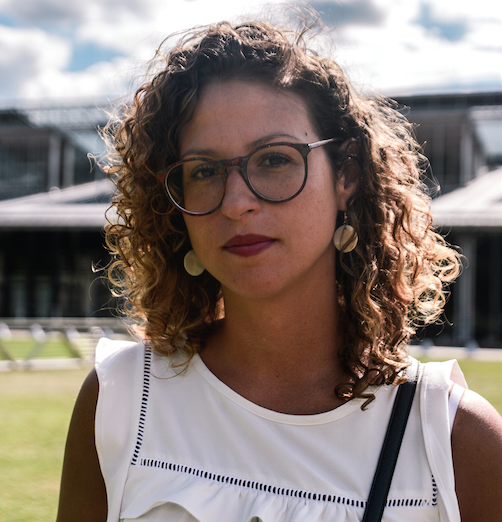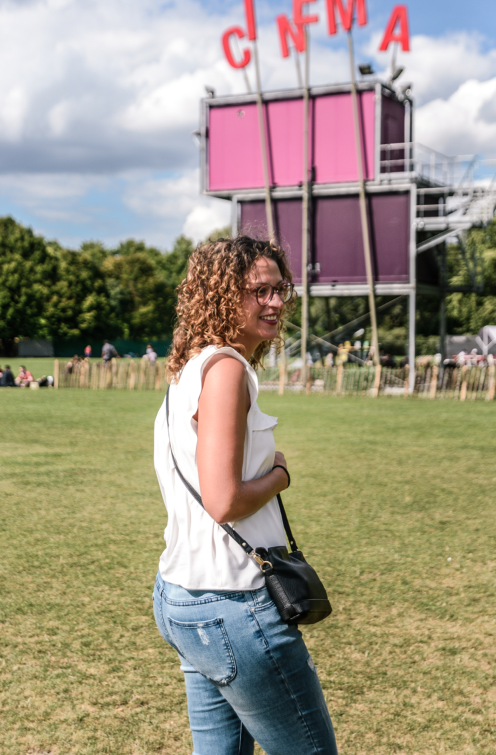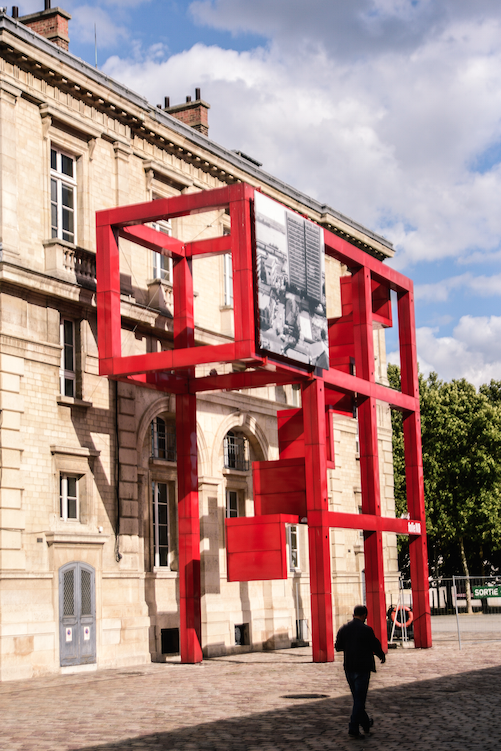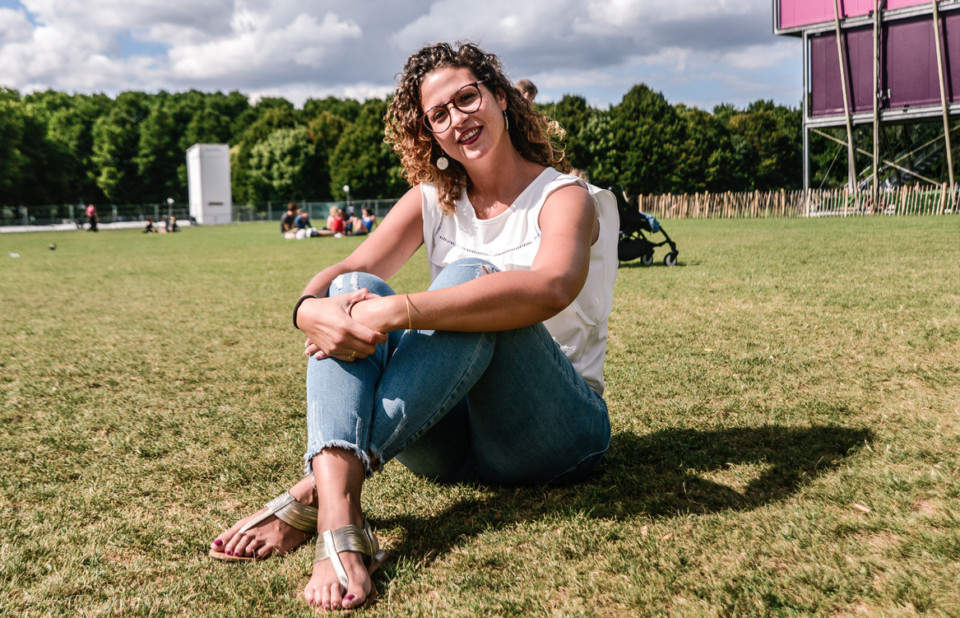C A R O L I N E
Paris | 2017

C A R O L I N E
City — Paris
Age — 31
Love life — Boyfriend
Profession — Project Manager at the Investment Service of the Prime Minister
Years in Paris — 5
Location — Parc de la Villette
‘I AM DEFINITELY
NOT A
TRADITIONAL
PARISIENNE!’

- What makes you really happy?
“Exchanging thoughts with my friends and family. In my job, in my relationship, in my entire life: getting to know people and discovering their opinions is really important to me. That is also the reason why I prefer to stay with the locals when I am traveling. I want to live the real life and visit the restaurants and shops they are going to. I can say I really know Cuba, because I got to know the locals.” - What is your best personality trait?
“That I’m open minded. I grew up in a multicultural environment: my mother is French and my father – who was a famous soccer player and later trainer – is from Uruguay. My parents have a big heart and were always helping other people. All the time people from abroad would stay at my parents’ house. From family from Uruguay who wanted to take their chances in Europe to a soccer player from Africa who was looking for a team. It’s a big advantage that I always had this multicultural ambiance around me, because I can adapt myself to any situation. My boyfriend, who is from the Republic of Central Africa, helps me discover another culture as well. I like to challenge and investigate clichés, like that people from Africa are poor or not smart. But I know I am an exception, especially after the terrorist attacks in France. Some people believe that all the Muslims are terrorists. I don’t want to live in that world, I want to live in an open and tolerant world. I judge people for who they are, not by the color of their skin, their religion or profession. But different groups stay more in their own circle nowadays.” - What is your biggest struggle in life?
“If I listen to my heart, I would like to have children, but it’s difficult to raise children in this world. I am pessimistic about life in general. I would like my children to live a good life without terrorist attacks and racism. I love Paris, but I don’t think it’s a good city for my children to grow up in. It’s too big and anonymous. I realize that if my boyfriend and I want to have children, we would have to move. We dream about living in Africa or South America.” - What is your biggest disappointment in life?
“I am trying really hard to think of something negative, but that is difficult. I try to forget the negative things in my life. I move on.”

- What is the biggest lesson life has taught you so far?
“To be perseverant in order to achieve your goal. If you really want something, even if it’s not easy, focus on your goal and you will get there. When I was really young, I already knew that I wanted to study in Uruguay for a while. But my parents couldn’t afford it, so I found a way. With the Erasmus Mundus Scholarship, I was able to study political science in Uruguay. A lot of my dreams came true: I worked as an intern at the French embassy in Uruguay, I played basketball on a professional level and in Uruguay I even played for the national team!” - What is your biggest sorrow in life?
“Racism, intolerance and injustice. That can really hurt me. I feel bad that I can’t always help everyone. I try it, but when I see all the immigrants in camps in Paris…I feel powerless. It’s not that those people wanted to risk their lives to come to Europe on a small boat. Those people thought that life would be better in Paris, but it’s not. I help as much as I can. When I don’t finish my meal in a restaurant, I ask for a doggy bag and give it to the people on the streets. And I donate my old clothes. A lot of people voted for Marine Le Pen. I don’t understand it. My father is colored, should I judge him because of his color?”
- What is the best advice someone ever gave you?
“Be patient, what you want to happen, will happen. That was advice my father gave me. I am a big dreamer, I want to experience and try a lot of things in life. And when I want something, I want it soon.” - What advice would you give other women in Europe?
“Keep fighting! Our society doesn’t treat women the same way as men. There are still differences in the salaries of men and women. Even in the political arena it’s still easier for men to get promoted than for women. Why?! We have the same brain and do the same work, why can’t we have the same responsibility! Women have to work harder to prove their value and then they seriously tell you, “Oh you are intelligent.” Yes of course I am intelligent! If you answer during a job interview that you don’t have children yet, they give you a certain look. But having children is the best thing that can happen to a woman, it must be treated like that, not like something that comes in the way of a career. So keep fighting to be recognized. Make people see your value.” - What are you insecure about?
“Terrorists. And the wickedness of people. Sometimes you meet people and they are really nice and funny. But later they show you another face. People do crazy things in order to have what they want. At work they talk about me behind my back. But that doesn’t make me insecure. Tomorrow or in a few months those people might want to change their mind about me.” - What does Paris mean to you?
“Paris is amazing. You are never finished discovering this big, beautiful city. It changes all of the time. One second you walk on a not so pretty street and the next second you see a beautiful park. But to me Paris mostly stands for connection because a lot of different people live alongside each other. There is African Paris, there is rich Paris, there is BoBo Paris (Bohemian Bourgeois). Although it would be better if there would be more connection between the different groups. If the typical Parisienne exists? I really don’t know, but I think it’s a cliché. I am definitely not a traditional Parisienne. I have lived here for five years now but when I go out people think I am not from here. Maybe because I try to talk with people in the metro. Some people like that, but others look at me like ‘why are you talking to me?’ When that happens, it can hurt for a second, because all I am doing is trying to make conversation. But I don’t give up. I focus on people who do want to talk with me!”
Photos by Hélène Koch

